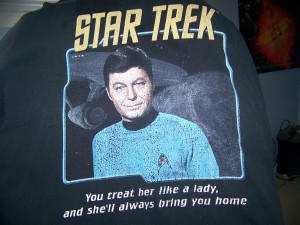I’ve spent the past few weeks every evening and many afternoons watching remastered versions of Star Trek The Original Series. I just finished up with Season One after watching Seasons Two and Three earlier. (My Season One disks didn’t run; they apparently were formatted for another region of the world. I had to buy a used Season One to complete the collection. It arrived several days ago.)
It’s amazing how brand new the episodes seem to me. Seeing them again was almost (almost!) like seeing them for the first time. I didn’t remember how some of the shows ended, or the complete trajectory of many of the stories. Of course, I had the ones that prominently featured De pretty well committed to memory, but the others were less well remembered.
I have to say it again: The writing of the series was exemplary. As a professional writer these days, I can truly appreciate the scripts in ways I didn’t as a teen-aged viewer. (Well, of course I appreciated the writing as a teenager–“if it ain’t on the page, it ain’t on the stage”–but I wasn’t seeing it from a professional writer’s perspective at that age.)
If you haven’t watched the original series in a long time–or ever–this is the year to do it. I think it will impress you the way it impresses me.
The shows are still contemporary when it comes to the issues they tackle–sadly enough. Roddenberry wasn’t just entertaining people; he was writing morality plays, rewriting the rules by which people would treat others: rewiring racist brains to see people of color and people from different nations and worlds as people with intrinsic value; rewiring brains infected by misogyny to anticipate the arrival of female executives (although, IMHO, he did a pretty piss-poor job of it. Women were called “girls” and seemed to be considered largely play things and recreational sex objects unless they were married to someone or a serious romantic interest). He was no feminist.
He tackled the military industrial complex several times in lots of different ways. The Enterprise’s five-year mission was peaceful. Its “warriors” were summoned only when there appeared to be no other way out of a dilemma. Arguments raged among crew members as to whether arming a native population would help or harm them in the long run.
Alien species were misunderstood (in The Devil in the Dark, the Horta was discovered to be a mother–the last of her kind–protecting her unhatched children), mild, militant (Romulans, Klingons), exotic (Orion slave girls), slavers, misbehaving children (The Squire of Gothos)–and utterly riveting. Blind hatred was examined and lambasted.
The stories are as valid today as they were then… perhaps even more valid today as our societies are torn apart by the circus maximus agenda within mainstream and other media that pits opposing viewpoints as struggles between good and evil rather than mere differences of opinion.
Star Trek predicts that we’ll make it past these current terrible times and survive to expose and extend our true value as a species. I sincerely hope the prediction is correct…
Live long and prosper!
